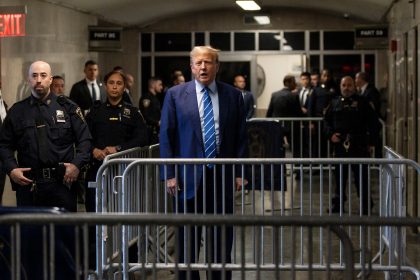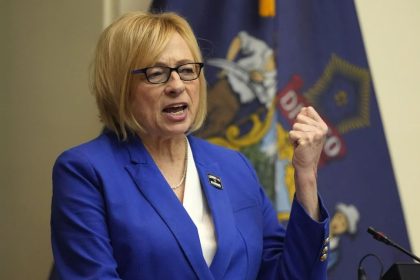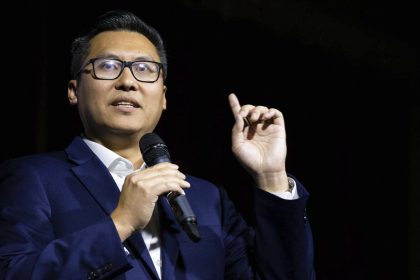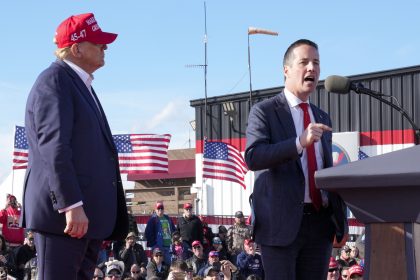Replacing The Electoral College Won’t Be Easy And Will Require Lots of Soul-Searching

This week Senator Elizabeth Warren, D-Mass., made the biggest splash of her nascent presidential campaign by suggesting during a CNN town hall in Mississippi that the Electoral College should be retired and replaced by a popular-vote system that would ensure that all voters count.
The moment came when a young woman in the audience asked how Warren would expand voting rights to the formerly incarcerated and ensure access to online voter registration and non-excuse, early voting.
“Great question, but can I go you one bigger?” Warren said. “I believe we need a constitutional amendment that protects the right to vote for every American citizen and to make sure their vote gets counted. We need to put some federal muscle behind that.”
The senator then observed that when the primaries give way to the general election campaign for the White House, presidential hopefuls rarely if ever visit states like Mississippi.
They’ll show up in places like California and Massachusetts that are flush with Electoral Votes, Warren suggested, but forego anyplace else that’s not a battleground state.
“Well, my view is that every vote matters and the way we can make that happen [is to] have national voting and that means get rid of the electoral college,” Warren said.
By Tuesday, a number of her Democratic primary opponents were chiming in, including former Texas Rep. Beto O’Rourke, who told MSNBC’s Garrett Haake after a college event in Pennsylvania that he thought there was “a lot to” what Warren had proposed.
“You had an election in 2016 where the loser got 3 million more votes than the victor,” O’Rourke said in a video of the event that’s since been posted to YouTube. “It puts some states out of play all together.”
Later that night, in an appearance on “Jimmy Kimmel Live,” California Sen. Kamala Harris said she would be “open to the discussion” of abolishing the Electoral College.
“There’s no question that the popular vote has been diminished in terms of making the final decision about who’s the president of the United States and we need to deal with that,” she said.
States Going Their Own Way
It’s not surprising that the Electoral College is coming under increasing criticism from Democrats still smarting from President Donald Trump winning the 2016 election despite losing the popular vote.
And those with longer memories remember that former President George W. Bush also won the presidency in 2000 after losing the popular vote to Democratic standard-bearer and former Vice President Al Gore.
There’s even a growing movement in several states, the so-called National Popular Vote Interstate Compact, to bypass the electoral college in favor of rewarding the candidate who wins the popular vote, regardless of what the traditional outcome in the Electoral College is.
According to a website run by National Popular Vote Inc., a 501(c)(4) non-profit corporation, so far 12 states and the District of Columbia, representing a total 181 electoral votes, have enacted legislation to formally enter the compact.
The agreement will take effect when states representing an additional 89 electoral votes — adding up to a total 270 electoral votes, the amount needed to win the presidency — do the same.
Compact-related bills are currently on the governor’s desk in Delaware and New Mexico, and they’ve passed in at least one house of the legislature in eight other states, including a 40–16 vote in the Republican-controlled Arizona House and a 28–18 in Republican-controlled Oklahoma Senate.
In another sign of the bipartisan dissatisfaction with the Electoral College, Compact bills have been approved unanimously by committee votes in two additional Republican-controlled states, Georgia and Missouri.
“A lot of people have raised objections to the Electoral College over the years, but changing the constitution, which would be the traditional way of doing it, is a hugely difficult task — and that’s by design,” said Stephen Farnsworth, a professor of political science at University of Mary Washington in Fredericksburg, Virginia.
“It’s very easy to express frustration, but the founders didn’t want the electoral process to be amended and reinvented every time someone was irritated by a political outcome.”
Amending Constitution A Slow, Uncertain Process
To illustrate how cumbersome the process of eliminating the Electoral College would be — and how long it would take — Farnsworth pointed to the ratification of the Twenty-seventh Amendment.
The Twenty-seventh Amendment, requires that any change to the rate of compensation for members of the Congress take effect only after the subsequent election in the House of Representatives.
The amendment was the second of 12 amendments proposed by the first Congress in 1789, 10 of which would quickly be ratified and become the Bill of Rights. The Congressional pay amendment took a little longer. It wasn’t ratified by the now requisite 38 states until May 1992, 202 years after its original proposal.
“Now imagine if you’re trying to ratify an amendment that’s a bit more controversial, like abolishing the Electoral College,” Farnsworth said. “You may well get it through Congress, but then how do you sell it to the states that have only three or four electoral votes today, but enjoy a disproportionate amount of influence?
“For instance, today Virginia gets a lot of attention from presidential candidates. I would imagine Virginia’s elected officials would oppose changing the Electoral College system because they don’t want to give up their influence. The same would be true for Florida and Pennsylvania and Michigan.
“You don’t have to try very hard to come up with a list of enough states — you only need 13 — to block a constitutional change to the Electoral College.”
Which is one reason why the current national popular vote movement is intriguing to Richard Himelfarb, a professor of political science at Hofstra University in New York.
“It’s basically a legal end run around having to amend the Constitution, and relatively easier to accomplish,” he said. “Of course the question is, can you actually get enough states to get on board to reach the 270 electoral vote threshold for it to go into effect?”
Himelfarb believes that it could happen.
“It’s entirely possible,” he said. “It possible that in the next five or 10 years enough states would sign on that it actually would be used in a presidential election. Then the question becomes, is it constitutional?
“Remember, the Supreme Court does not take up hypothetical cases, so this question is not going to arise until after a national election takes place under the new system,” he continued. “So what will no doubt happen if a national popular vote methodology is adopted is that you’ll have one candidate declared the victor and the other, who could presumably have won under the old Electoral College system, will take the issue to court.”
Asked what he thought might happen then, Himelfarb admitted it is anybody’s guess.
“I’m not a constitutional law expert, but it seems to me that one argument will be that the election result should be allowed to stand because the Constitution does not prescribe for states exactly how electors are to be chosen and how they are told to vote,” he said.
“The counter-argument to that, of course, is that there has been a general understanding for almost 200 years that electors are supposed to vote for the person who wins the most votes in their state,” Himelfarb continued. “I could see this going either way. And again, we won’t know until it happens.”
Would Different Really Be Better?
The other question that remains unanswered on the campaign trail heading into the 2020 election is whether any system lawmakers came up with to replace the Electoral College, would in fact be “better.”
“One thing I think everyone who studies politics appreciates is the nature of unintended consequences,” Farnsworth said. “Whenever you change something, you may get something good, but may also get something that’s problematic in ways you never considered.”
“I mean, look at the Florida recount situation we had in 2000. Because we had the Electoral College, the problems we saw in Florida were contained to just one state,” he said. “I’m not sure how you’d address that situation in a national popular vote scenario.”
For Himelfarb, the new and unforeseen issues that may arise from an Electoral College replacement will stem from the questions we as a nation ask ourselves today.
“Initially, it’s a matter of first principles,” he said. “The framers of the Constitution did not want to create a country that was dominated by elites from the large states with significant urban populations. They were concerned a system with a popular vote would marginalize smaller states and people in rural areas. The Electoral College was a compromise.
“So the first question you have to ask yourself is do we need to abide by that compromise, or has its time passed? Is the Electoral College an anachronism?” Himelfarb said.
From there, he suggests, things could get woolly.
“That’s because you now have to deal with another question, and one I think a lot of average people will ask as they consider whether to endorse a move away from the Electoral College or not: Will a change help my side or hurt my side?”
“I mean, that’s the modern political question, isn’t it? That’s how we roll. It doesn’t really matter what the underlying principles are. The question is, is this going to help me win or is it going to hurt me? And it is going to be very interesting to see how the conflict between the first principles of the founders and our modern way of looking at things resolves itself.”
There is at least one thing we do know 592 days from the 2020 presidential election, it will be decided in the Electoral College, Farnsworth said.
“A lot of people are talking right now about changing the electoral system, but remember, it hasn’t happened in the past 200 years. It’s not going to happen in the next two,” he said.























